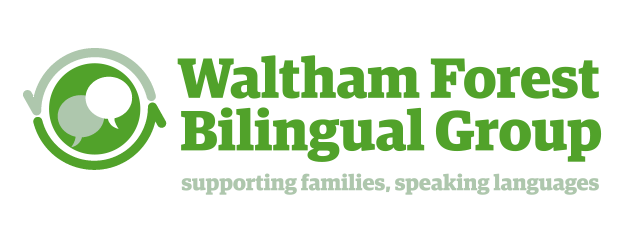WALTHAM FOREST BILINGUAL GROUP – SUPPORTING FAMILIES SPEAKING LANGUAGES
Being multilingual brings many advantages – to the children, to our community, to our economy. However in many cases due to a lack of information, multilingual parents choose to speak to their children in English. Over 20 per cent of people living in Waltham Forest speak a language other than English, but Britain remains a very monolingual country where people speaking only one language is regarded as normal despite the fact that worldwide more than two-third of people are bilingual. Speaking only one language is the exception, not the norm.
Waltham Forest Bilingual Group (WFBG) is a local voluntary group of multilingual parents established in 2003. Our aim is to promote, foster, encourage and celebrate linguistic and cultural diversity by supporting parents raising their children bilingually.
- Online Workshops for new parents: workshops will use light-hearted exercises, discussion, and question and answer sessions to give a basic introduction to what the group members have learnt about what works for and in different bilingual families. Our workshops are run by parents for parents.
*First Step*: Workshop for parents of children aged 0-3
*Next Step*: Workshop for parents of children aged 4 and over which focuses on keeping up with more than one language as children start to read and write.
Check our calendar for dates and other special events. - How you can support WFBG’s activities: Over the years, WFBG has given advice and support to hundreds of multilingual families in Waltham Forest and North East London. All of our activities are free to anyone interested in multilingual issues. For the remaining cost of our activities, we rely on grants from trusts and foundations.
If you wish to become a member or simply support our group, please get in touch.
KEY TIPS FOR NEW PARENTS
- Never accept advice to stop speaking your language from a doctor, teacher, health visitor or midwife. Ask to be referred to a bilingualism specialist speech therapist who will discuss your situation in detail with you, and most probably advise you to do exactly the opposite. It used to be thought that speaking more than one language confused children. Parents often still think that if a child speaks a language other than English at home, they will fall behind at school. These beliefs have been shown to be false, and research has demonstrated that multilingual children who are born in the UK or arrive when they are very young do at least as well at school and in fact consistently outperform monolingual children in certain thinking tasks.
- Speak your mother tongue or most fluent language to your children. Although it’s probably wise that your children have some access to English before starting school at age 4 or 5, ultimately they are much more likely to lose their second language than they are to suffer through not speaking English at such a young age. Children will pick up English incredibly quickly via playgroups and nursery.
- Use all available resources in your language: TV, games, board-games, DVD, books, computer games and visits to relatives and friends. The more input you provide, both in terms of quality and quantity, the more output in either language you should get.
- Set yourself a goal and decide how important this is to you. Do you want your child to be able to speak and understand only? Do you want them to read a newspaper, write a letter, hold down a job?
- Finally and most importantly, don’t give up. Most children with bilingual parents who end up monolingual, do so because their parents gave up. There will be ups and downs. Children will resist and tell you that they don’t like their weaker language. Don’t force them to speak your language, but at the same time, don’t give up speaking to them in your language. Continue to show your child how important the language is to you and how much you want them to be able to use it.
Although children sometimes can be reluctant to speak their mother tongue, adults who are bilingual are almost always extremely grateful to their parents that they made the effort and didn’t give up.
Growing up with languages – Reflections on Multilingual Childhoods, by Claire Thomas was published in 2012 by Multilingual Matters. The book focuses on experiences of people who grew up speaking two or more languages and provides insight into a wide variety of bilingual backgrounds.
If you think you can help with a translation into your own language, please contact us.
